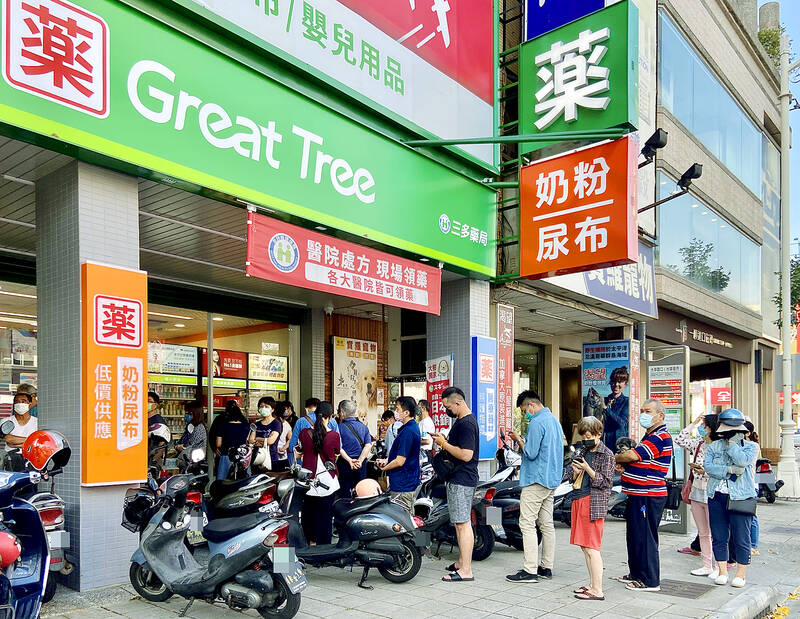The number of drugstores, as well as pharmaceutical and medical supply retailers, reached 10,584 last year, surpassing the number of convenience stores, as companies seek to tap into the market for the nation’s rapidly aging population, Sinyi Realty Inc (信義房屋) said on Wednesday.
The number suggests a new high, as revenue in the sector last year grew 7 percent year-on-year to NT$166.9 billion (US$5.44 billion), Sinyi Realty said, citing data from the Ministry of Finance.
The uptrend can be attributed to Taiwan’s fast-growing population of elderly people, Sinyi Realty research manager Tseng Ching-der (曾敬德) said, with people aged 65 or older forecast to reach 4.68 million in 2025, or 20 percent of the total, pushing Taiwan into the ranks of super-aged societies.

Photo: CNA
Elderly people regularly visit drugstores to have their prescriptions filled, and purchase health supplements and medical equipment, Tseng said.
Drugstores have diversified their operations to offer pet care products and services to meet demand, he said.
Furthermore, pharmacies have evolved into chain stores to serve more customers and grab more market share, Tseng said.
Chain stores make up 20 percent of the drugstore market in Taiwan, far lower than that in the US and Japan, suggesting ample room for improvement, he added.

Taiwan Semiconductor Manufacturing Co (TSMC, 台積電) would not produce its most advanced technologies in the US next year, Minister of Economic Affairs J.W. Kuo (郭智輝) said yesterday. Kuo made the comment during an appearance at the legislature, hours after the chipmaker announced that it would invest an additional US$100 billion to expand its manufacturing operations in the US. Asked by Taiwan People’s Party Legislator-at-large Chang Chi-kai (張啟楷) if TSMC would allow its most advanced technologies, the yet-to-be-released 2-nanometer and 1.6-nanometer processes, to go to the US in the near term, Kuo denied it. TSMC recently opened its first US factory, which produces 4-nanometer

GREAT SUCCESS: Republican Senator Todd Young expressed surprise at Trump’s comments and said he expects the administration to keep the program running US lawmakers who helped secure billions of dollars in subsidies for domestic semiconductor manufacturing rejected US President Donald Trump’s call to revoke the 2022 CHIPS and Science Act, signaling that any repeal effort in the US Congress would fall short. US Senate Minority Leader Chuck Schumer, who negotiated the law, on Wednesday said that Trump’s demand would fail, while a top Republican proponent, US Senator Todd Young, expressed surprise at the president’s comments and said he expects the administration to keep the program running. The CHIPS Act is “essential for America leading the world in tech, leading the world in AI [artificial

REACTIONS: While most analysts were positive about TSMC’s investment, one said the US expansion could disrupt the company’s supply-demand balance Taiwan Semiconductor Manufacturing Co’s (TSMC, 台積電) new US$100 billion investment in the US would exert a positive effect on the chipmaker’s revenue in the medium term on the back of booming artificial intelligence (AI) chip demand from US chip designers, an International Data Corp (IDC) analyst said yesterday. “This is good for TSMC in terms of business expansion, as its major clients for advanced chips are US chip designers,” IDC senior semiconductor research manager Galen Zeng (曾冠瑋) said by telephone yesterday. “Besides, those US companies all consider supply chain resilience a business imperative,” Zeng said. That meant local supply would

Servers that might contain artificial intelligence (AI)-powering Nvidia Corp chips shipped from the US to Singapore ended up in Malaysia, but their actual final destination remains a mystery, Singaporean Minister for Home Affairs and Law K Shanmugam said yesterday. The US is cracking down on exports of advanced semiconductors to China, seeking to retain a competitive edge over the technology. However, Bloomberg News reported in late January that US officials were probing whether Chinese AI firm DeepSeek (深度求索) bought advanced Nvidia semiconductors through third parties in Singapore, skirting Washington’s restrictions. Shanmugam said the route of the chips emerged in the course of an